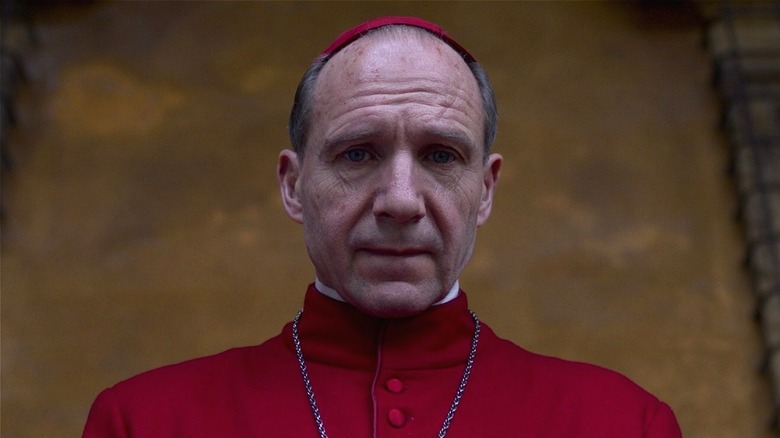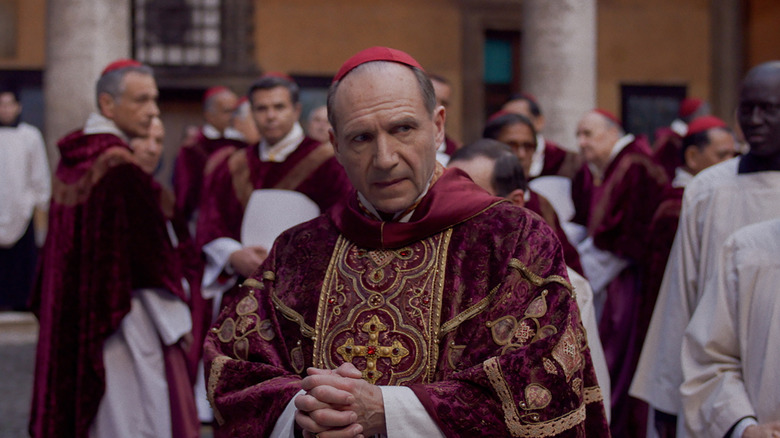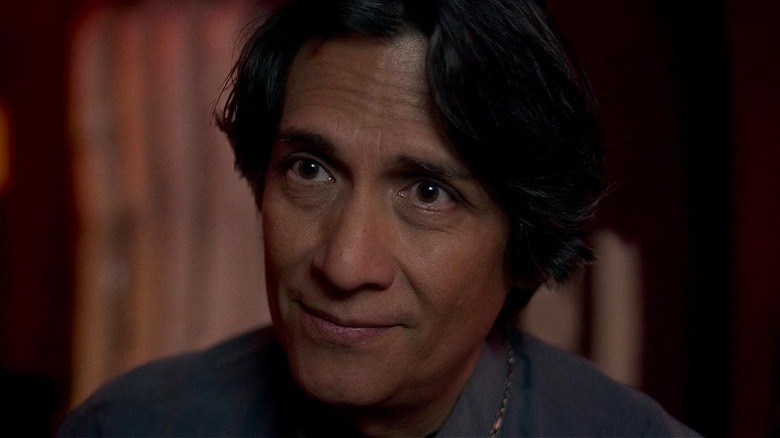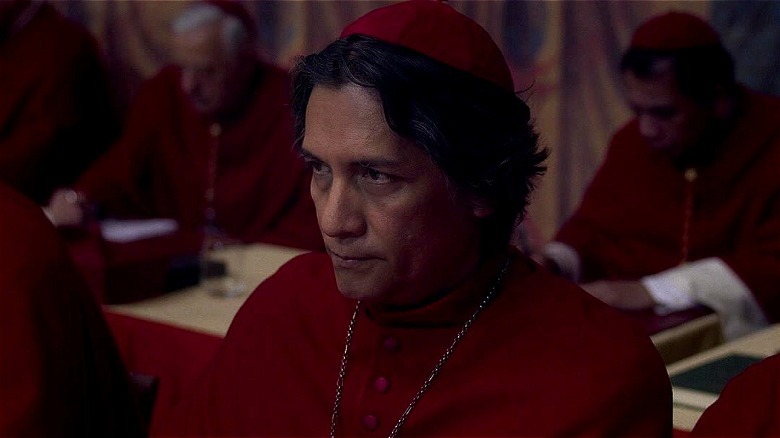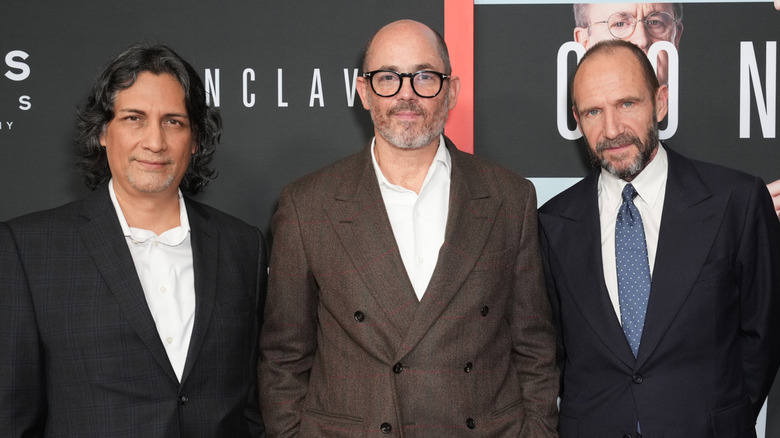Conclave Ending Explained: What The Final Twist Means
Based on the novel by Robert Harris, "Conclave" was one of the best movies of 2024: a riveting political thriller about the pursuit of power, with the election at its center not for a president or a prime minster — but the pope.
"Conclave" follows Cardinal Thomas Lawrence (the iconic Ralph Fiennes in an Academy Award-nominated performance), a noble but conflicted dean of the College of Cardinals. When the pope dies of a heart attack, Lawrence is put in the unenviable position of leading the conclave that will determine his successor. Sequestered in the Sistine Chapel and unable to leave until the new pope is chosen, the cardinals wage an internal "holy war" of conflicting philosophies and hidden agendas. Ultimately, the judgment of the conclave will determine the future of the Roman Catholic Church, and possibly the world.
Bursting at the cassock seams with dramatic revelations and scalpel-sharp wit, it's not surprising that "Conclave" won the Academy Award for best adapted screenplay. Every character in "Conclave" has a secret — some more explosive than others. And as the elaborate plot unfolds, it can be difficult for viewers to follow all the threads, especially when the most important truth of all is revealed in the last 10 minutes. Here is what the final twist of "Conclave" means.
What you need to remember about the plot of Conclave
Of the cardinals gathered from all over the world to Vatican City, four contenders for the papacy emerge: Aldo Bellini (Stanley Tucci), Joseph Tremblay (John Lithgow), Joshua Adeyemi (Lucian Msamati), and Goffredo Tedesco (Sergio Castellitto). The surprise entrance of Cardinal Vincent Benitez (Carlos Diehz) disrupts the conclave; unknown to the other cardinals, Benitez was secretly appointed by the Pope to minister in dangerous territories like Kabul.
Experiencing a crisis of faith, Lawrence gives a sermon about accepting doubt and mystery. This unexpectedly stirs up support for him as the next pope, and Benitez votes for Lawrence despite his protests. With no candidate securing a majority on the first round of voting, Lawrence becomes entangled in the power struggles of the would-be popes and their clashing ideals. He also learns that Benitez canceled a medical appointment in Switzerland — which the late pope paid for.
Adeyemi's campaign implodes when a nun confronts him; word spreads that the conservative cardinal had a forbidden affair. The more progressive Lawrence and Bellini split the vote, giving the moderate Tremblay an edge over Tedesco. Lawrence and Sister Agnes (Isabella Rossellini) discover that Tremblay arranged the arrival of Adeyemi's former lover and committed the sin of simony by paying cardinals for votes. Together, they publicly discredit Tremblay, despite Bellini's fears that the zealous Tedesco becoming pope would drag the Church back to the dark ages. The cardinals gather to vote again — and then a terrorist bombing rocks the Sistine Chapel.
What happens at the end of Conclave
As "Conclave" nears its end, the cardinals are physically unharmed but psychologically shaken by the bombing. In this moment of spiritual crisis, choosing the right man to become pope becomes more critical than ever. Tedesco urges the Catholic Church to engage in a holy war with Islam, angering many of the cardinals with his xenophobic fury. Benitez, drawing upon his experiences ministering in war-torn nations, stands up to Tedesco and contends that the Church must pursue peace instead of violence. The Church is not about the past or tradition, he argues, but about "what we do next." In the wake of this inspiring speech, Benitez is elected pope and adopts the new name Innocent.
Lawrence is relieved by Benitez's victory, but there is still the concern about his health and the mysterious canceled medical appointment in Switzerland. Alone with Lawrence, Benitez discloses that he was born intersex, a fact unknown to him until adulthood, when an abdominal surgery revealed that he had a uterus and ovaries. Benitez offered his resignation to the late pope, who instead accepted him. Benitez made an appointment in Geneva for a laparoscopic hysterectomy; after prayer and reflection, he canceled it, deciding "I am what God made me." Keeping this new knowledge to himself, Lawrence returns to his room as the world outside celebrates the election of Pope Innocent.
What the end of Conclave means
"Conclave" is ultimately a film about tradition versus progress, and in the end, progress prevails. Lawrence's homily implores the cardinals to embrace uncertainty, and in the end the majority takes a leap of faith by choosing an outsider to be their new spiritual leader. As pope, Benitez will be an advocate for social justice and reform rather than the rigidity of tradition — even his chosen name, Innocent, suggests his inner virtue.
Being intersex, according to Benitez, also helps him to "know what it is to exist between the world's certainties." (The word "intersex" is not specifically used in the film, leaving some viewers unsure about what Benitez reveals to his fellow cardinal.) Benitez knows who he is and is at peace with himself, in contrast to Lawrence, who has been plagued by self-doubt throughout the film. Their conversation is one of clarity and acceptance, but there is a lingering awareness that this is an unprecedented, and potentially explosive, development for a patriarchal institution like the Catholic Church.
"Conclave" is also a movie about secrets coming to light. Every potential pope has a secret they want to protect, from Tremblay's bribes and Adeyemi's affair to even Lawrence's doubts about the Church. But those men are motivated by either shame or relentless ambition, and Benitez is, well, innocent. Lawrence chooses to protect him, once again embracing uncertainty. When we last see Lawrence in his room, he is opening a window to let the light in.
What the cast and crew has said about Conclave
The final plot twist in "Conclave" risks embodying the "Unsettling Gender Reveal" cinematic trope, which presents a sensationalistic and dehumanizing depiction of trans and gender non-conforming characters. But "Conclave" director Edward Berger told Vanity Fair that the fateful conversation between Lawrence and Benitez was not filmed for "shock value," adding, "We wanted it to play as subtly and as sensitively as possible."
Film editor Nick Emerson discussed the twist with The Wrap and the efforts made by the filmmakers to ensure it was not treated like a "punchline." Emerson emphasized that the scene, comprised mainly of close-ups, was carefully constructed to "match the calming presence of Cardinal Benitez."
Benitez serves as the film's moral center, and his election signals a new age of hope and change in a chaotic and imperfect world. Actor Carlos Diehz shared his personal admiration for Benitez with FilmSlop, saying that the character shows "there are people in the Church that are really committed to the principles of the gospel in a practical manner to bring hope and to bring justice to people." Will the Catholic Church follow Pope Innocent's lead and continue to embrace progress? With no "Conclave 2" on the horizon, audiences can only have faith.
